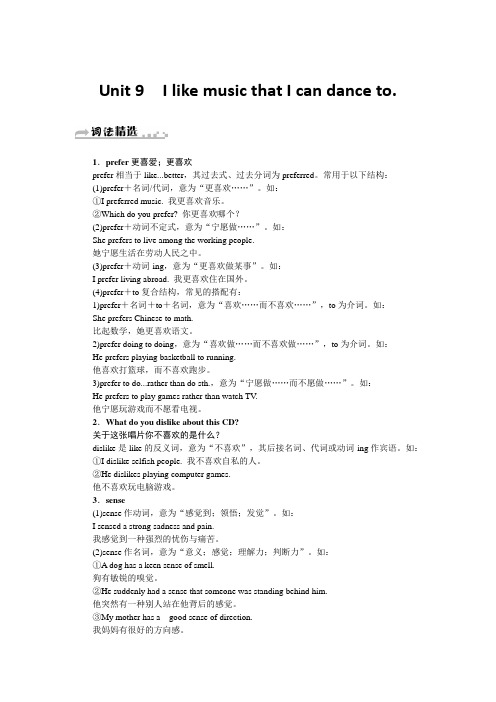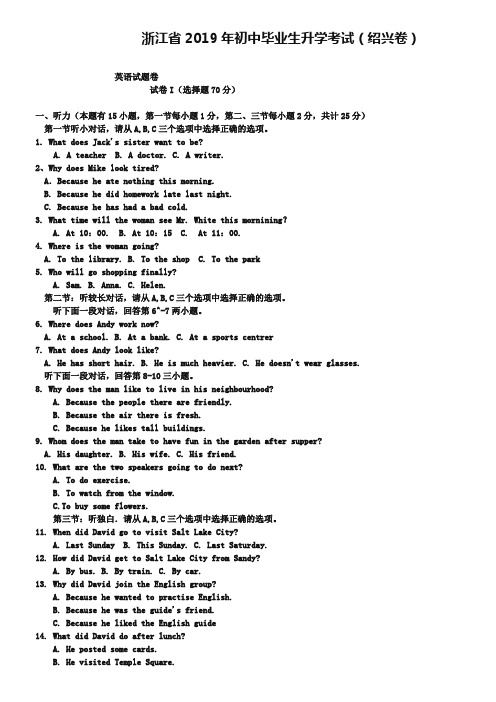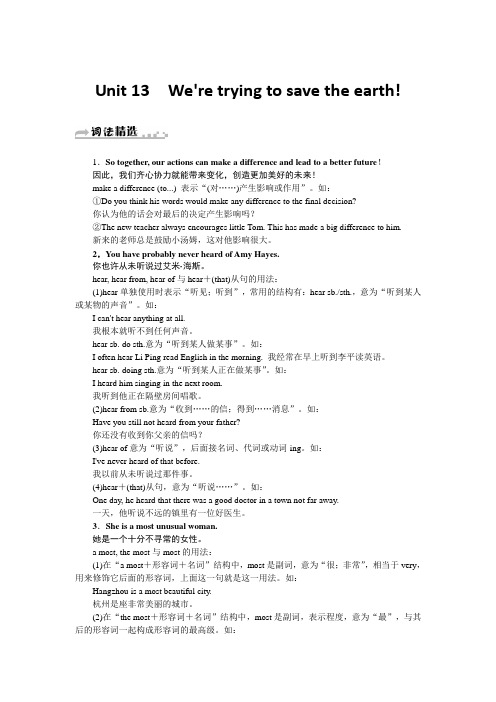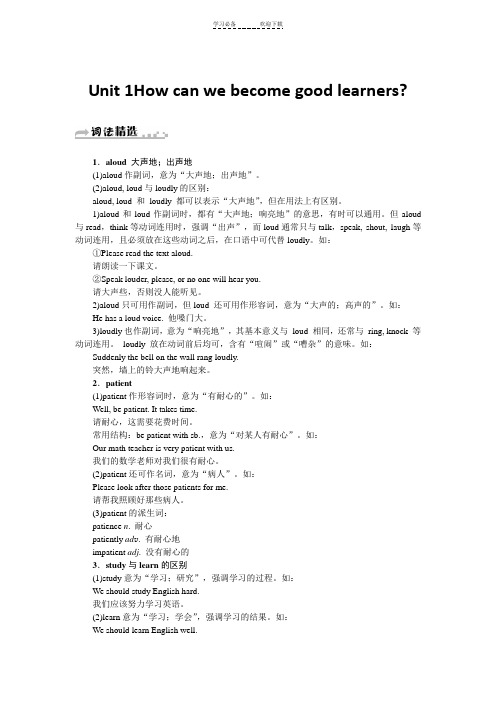绍兴版九年级英语词法语法句法手册(讲解习题答案)
绍兴版九年级英语词法语法句法手册Unit2讲解+习题+答案

Unit 2 I think that mooncakes are delicious!L►糊法精选.■一1.I've put on five pounds.我已经增重5磅了。
put on的用法:(1)意为“把……放在……上”。
如:Could you please put the plate on the table?你能把那只盘子放在桌上吗?(2)意为“穿上;戴上”。
如:He put on his hat and went out of the office without a word.他戴上帽子,一言不发走出了办公室。
(3)意为“上演;演出;展览”。
如:They are going to put on Harry Potter III.他们将上映《哈利・波特m》。
(4)意为“增加(体重、费用等)”。
如:He has put on weight during the last two months.他上两个月里体重增加了。
2.People go on the streets to throw water at each other.人们到街上相互泼水。
throw作及物动词,意为“扔;投;抛”,其过去式和过去分词分别为threw, thrown。
常用短语:throw at,意为“向...... 扔";throw to意为“扔给.... ";throw away意为“扔掉”。
如:①He caught the rope we threw to him.他抓住了我们扔给他的绳子。
②She threw the banana peel into the trash bin.她将香蕉皮扔进了垃圾筒。
3.He quickly laid out her favorite fruits and desserts in the garden.他很快地将她最喜欢的水果和甜点在花园里摆开。
绍兴版九年级英语词法语法句法手册Unit6(讲解+习题+答案)

Unit 6When was it invented?1.I think the TV was invented before the car.我认为电视机是在小汽车之前被发明的。
(1)invent是动词,意为“发明”。
如:Bell invented the telephone. 贝尔发明了电话。
(2)invention是名词,意为“发明(不可数);发明物(可数)”。
如:This is one of Edison's inventions.这是爱迪生的发明之一。
(3)inventor是名词,意为“发明者;创造者”。
如:Edison is one of the greatest inventors in the world. 爱迪生是世界上最伟大的发明者之一。
(4)discover与invent的区别:discover意为“发现”,发现的对象是本来存在的;而invent意为“发明”,发明的对象是以前没有的新东西,如工具、手段或方法。
如:①Columbus discovered America in 1492.在1492年哥伦布发现了美洲。
②The telephone was invented in 1876.在1876年电话被发明了。
2.They're used for seeing in the dark.它们被用于在黑夜里观看。
(1)be used for意为“被用来做……”,介词for表示目的和用途,后面接名词或动词-ing。
如:①Sweaters are used for keeping warm.毛衣是用来保暖的。
②Wood can be used for making paper.木材可以被用来造纸。
(2)含有be used的其他常用短语:1)be used to do sth.意为“被用来做……”。
如:This machine is used to clean the wall.这台机器是用来清洁墙面的。
绍兴版九年级英语词法语法句法手册Unit9(讲解+习题+答案)

Unit 9I like music that I can dance to.1.prefer更喜爱;更喜欢prefer相当于like...better,其过去式、过去分词为preferred。
常用于以下结构:(1)prefer+名词/代词,意为“更喜欢……”。
如:①I preferred music. 我更喜欢音乐。
②Which do you prefer? 你更喜欢哪个?(2)prefer+动词不定式,意为“宁愿做……”。
如:She prefers to live among the working people.她宁愿生活在劳动人民之中。
(3)prefer+动词-ing,意为“更喜欢做某事”。
如:I prefer living abroad. 我更喜欢住在国外。
(4)prefer+to复合结构,常见的搭配有:1)prefer+名词+to+名词,意为“喜欢……而不喜欢……”,to为介词。
如:She prefers Chinese to math.比起数学,她更喜欢语文。
2)prefer doing to doing,意为“喜欢做……而不喜欢做……”,to为介词。
如:He prefers playing basketball to running.他喜欢打篮球,而不喜欢跑步。
3)prefer to do...rather than do sth.,意为“宁愿做……而不愿做……”。
如:He prefers to play games rather than watch TV.他宁愿玩游戏而不愿看电视。
2.What do you dislike about this CD?关于这张唱片你不喜欢的是什么?dislike是like的反义词,意为“不喜欢”,其后接名词、代词或动词-ing作宾语。
如:①I dislike selfish people. 我不喜欢自私的人。
②He dislikes playing computer games.他不喜欢玩电脑游戏。
绍兴版九年级英语词法语法句法手册Unit7(讲解+习题+答案)

Unit 7Teenagers should be allowed tochoose their own clothes.1.I don't think sixteen-year-olds should be allowed to get their ears pierced.我认为不应该允许16岁的孩子穿耳洞。
(1)当主句的主语是第一人称I或we,谓语动词是think, believe, suppose, guess等词时,其后的从句不能是含有not的否定句;若要否定,须将not提到主句。
在翻译时,按汉语习惯翻译。
例如:“我想他不会给你打电话的”应译为I don't think he will give you a call.,而不是I think he won't give you a call.。
(2)本句中的sixteen-year-olds相当于sixteen-year-old teenagers,意为“16岁的孩子”。
数词和一个相应的名词单数用“-”连接起来,可以构成一个合成形容词。
也可以是数词、单数名词和形容词用“-”连接起来作形容词。
如:a 300meterlong river一条300米长的河流a twomonth holiday两个月的假期a sixty-pound stone一块60磅重的石头(3)get their ears pierced属于“get/have+名词/代词+动词的过去分词”结构,意为“使……被做;请人做……”。
如:①I'll go out to get my hair cut.我要出去理发。
②Why haven't you got the work done yet?你为什么还不叫人把活干了呢?2.I regret talking back, not listening to Mom.我后悔顶嘴了,没有听妈妈的话。
浙江省绍兴市中考英语试题及答案解析(word版)

浙江省2019年初中毕业生升学考试(绍兴卷)英语试题卷试卷I(选择题70分)一、听力(本题有15小题,第一节每小题1分,第二、三节每小题2分,共计25分)第一节听小对话,请从A,B,C三个选项中选择正确的选项。
1. What does Jack's sister want to be?A. A teacherB. A doctor.C. A writer.2、Why does Mike look tired?A.Because he ate nothing this morning.B. Because he did homework late last night.C. Because he has had a bad cold.3. What time will the woman see Mr. White this mornining?A. At 10:00.B. At 10:15C. At 11:00.4. Where is the woman going?A. To the library.B. To the shopC. To the park5. Who will go shopping finally?A. Sam.B. Anna.C. Helen.第二节:听较长对话,请从A,B,C三个选项中选择正确的选项。
听下面一段对话,回答第6^-7两小题。
6. Where does Andy work now?A. At a school.B. At a bank.C. At a sports centrer7. What does Andy look like?A. He has short hair.B. He is much heavier.C. He doesn't wear glasses.听下面一段对话,回答第8-10三小题。
8. Why does the man like to live in his neighbourhood?A. Because the people there are friendly.B. Because the air there is fresh.C. Because he likes tall buildings.9. Whom does the man take to have fun in the garden after supper?A. His daughter.B. His wife.C. His friend.10. What are the two speakers going to do next?A. To do exercise.B. To watch from the window.C.To buy some flowers.第三节:听独白.请从A,B,C三个选项中选择正确的选项。
绍兴市第一中学初中英语九年级全册Unit 11知识点复习(答案解析)

一、选择题1.People _________ pale skin look good _________bright colors.A.in, on B.with, inC.on, in D.in, with B解析:B【详解】句意:有苍白皮肤的人穿着亮颜色衣服看起来很好看。
考查介词。
with有,具有,带有;on在……上;in+颜色表示“穿着某种颜色的衣服”。
第一空表“带有”之意,应该用with;第二空后接颜色,意为穿什么颜色的衣物,应该用in,故选B。
2.They are not twins, but look similar and they have something ______ common.A.for B.with C.in D.on C解析:C【详解】句意:他们不是双胞胎,但长得很像,而且有一些共同点。
考查介词。
A. for为了,给,对于;B. with和,用,有;C. in在……里;D. on在……上。
in common:共有,相同;have...in common:有...共同点,在某方面有相同之处。
例如,We happened to discover we had a friend in common. 我们凑巧发现我们有一个共同的朋友。
结合句意可知填in;选C。
3.In every ________ there has to be some give-and-take.A.friendship B.instrument C.attention D.blackboard A解析:A【详解】句意:在每一段友谊中都必须有一些互谅互让。
A. friendship意思是“友谊”;B. instrument 意思是“乐器、仪器”;C. attention意思是“注意”;D. blackboard意思是“黑板”。
根据后面的has to be some give-and-take.可知此处是说“友谊”,结合选项,可知A选项符合题意,故答案选A。
绍兴市第一中学初中英语九年级全册Unit 2知识点复习(答案解析)

一、选择题1.____my grandpa is over 80 years old, he still looks strong and healthy.A.Although B.Because C.Unless D.Until A解析:A【详解】句意:虽然我爷爷已经80多岁了,但他看起来仍然强壮健康。
考查连词辨析。
Although尽管,引导让步状语从句;Because因为,引导原因状语从句;Unless除非,引导条件状语从句;Until直到,引导时间状语从句。
根据下文“he still looks strong and healthy.”可知,这里是although引导的让步状语从句。
故选A。
2.-___________wonderful the music is! What’s its name?-Victory.A.How B.How a C.What D.What a A解析:A【详解】句意:——多么美妙的音乐啊!它的名字是什么?——Victory。
考查感叹句。
how和what都可用于引导感叹句:how修饰形容词或副词,what修饰名词或名词性短语。
本句wonderful(美妙的)是形容词,需用how引导。
根据句意结构,可知选A。
【点睛】表达欢喜、悲伤、惊讶等感情的句子称为感叹句。
一般以疑问词what或how起始,而以惊叹号终结。
感叹句通常有以下形式:一、How+形容词〔或副词〕+S+V…! 二、What a [an] +形容词+名词+S+V…! 若名词为不可数或复数的话,就不能用不定冠词。
例如:What bad weather we’re having!多讨厌的天气!三、How+形容词+ a [an] +名词+S+V…!3.—How do you celebrate______?—We usually eat zongzi and watch boat races.A.the Spring Festival B.the Mid-Autumn FestivalC.the Lantern Festival D.the Dragon Boat Festival D解析:D【详解】句意:——你怎样庆祝龙舟节?——我们通常吃粽子和观看龙舟比赛。
绍兴版九年级英语词法语法句法手册Unit13(讲解+习题+答案)

Unit 13We're trying to save the earth!1.So together, our actions can make a difference and lead to a better future!因此,我们齐心协力就能带来变化,创造更加美好的未来!make a difference (to...) 表示“(对……)产生影响或作用”。
如:①Do you think his words would make any difference to the final decision?你认为他的话会对最后的决定产生影响吗?②The new teacher always encourages little Tom. This has made a big difference to him.新来的老师总是鼓励小汤姆,这对他影响很大。
2.You have probably never heard of Amy Hayes.你也许从未听说过艾米·海斯。
hear, hear from, hear of与hear+(that)从句的用法:(1)hear单独使用时表示“听见;听到”,常用的结构有:hear sb./sth.,意为“听到某人或某物的声音”。
如:I can't hear anything at all.我根本就听不到任何声音。
hear sb. do sth.意为“听到某人做某事”。
如:I often hear Li Ping read English in the morning. 我经常在早上听到李平读英语。
hear sb. doing sth.意为“听到某人正在做某事”。
如:I heard him singing in the next room.我听到他正在隔壁房间唱歌。
(2)hear from sb.意为“收到……的信;得到……消息”。
九年级英语词法语法句法手册(讲解+习题+答案)

Unit 1How can we become good learners?1.aloud 大声地;出声地(1)aloud作副词,意为“大声地;出声地”。
(2)aloud, loud与loudly的区别:aloud, loud 和loudly 都可以表示“大声地”,但在用法上有区别。
1)aloud和loud作副词时,都有“大声地;响亮地”的意思,有时可以通用。
但aloud 与read,think等动词连用时,强调“出声”,而loud通常只与talk,speak, shout, laugh等动词连用,且必须放在这些动词之后,在口语中可代替loudly。
如:①Please read the text aloud.请朗读一下课文。
②Speak louder, please, or no one will hear you.请大声些,否则没人能听见。
2)aloud只可用作副词,但loud 还可用作形容词,意为“大声的;高声的”。
如:He has a loud voice. 他嗓门大。
3)loudly也作副词,意为“响亮地”,其基本意义与loud 相同,还常与ring, knock 等动词连用。
loudly 放在动词前后均可,含有“喧闹”或“嘈杂”的意味。
如:Suddenly the bell on the wall rang loudly.突然,墙上的铃大声地响起来。
2.patient(1)patient作形容词时,意为“有耐心的”。
如:Well, be patient. It takes time.请耐心,这需要花费时间。
常用结构:be patient with sb.,意为“对某人有耐心”。
如:Our math teacher is very patient with us.我们的数学老师对我们很有耐心。
(2)patient还可作名词,意为“病人”。
如:Please look after those patients for me.请帮我照顾好那些病人。
绍兴版九年级英语词法语法句法手册Unit8(讲解习题答案)

Unit 8 It must belong to Carla.1.The hair band must belong to Linda.这个发带一定是琳达的。
belong to意为“属于”。
如:The car belongs to my uncle.这辆小汽车属于我叔叔。
这句话还可以说成:The car is my uncle's.这辆小汽车是我叔叔的。
当表述某物属于某人时,注意这两句的不同。
belong to后直接加人名或人称代词宾格,而第二句be动词后要用名词所有格形式或名词性物主代词。
如:①The book belongs to me.=The book is mine. 这本书是我的。
②The T-shirt belongs to Tom.=The T-shirt is Tom's. 这件T恤是汤姆的。
③Does the rabbit belong to your sister?=Is the rabbit your sister's? 这只兔子是你妹妹的吗?④Who does this coat belong to?=Whose coat is this? 这件上衣是谁的?2.the rest of+名词此短语意为“其余的;剩余部分的”,有时候直接用the rest。
如:While we clean the classroom, what will the rest of you do?我们打扫教室时,你们其余的人做什么呢?the rest短语作主语时,其谓语的单复数要根据the rest 所指的内容而定。
如:①Some students are on the playground, and the rest are s taying in the classroom. (指的是the rest of the students,谓语用复数)有些学生在操场上,而其余的待在教室里。
绍兴市第一中学初中英语九年级全册Unit 13知识点复习(答案解析)

一、选择题1.Waste paper must be ________ good use.A.put B.put toC.to put D.puts B解析:B【详解】句意:废纸必须好好利用。
put放置;put to放到;to put动词不定式;puts第三人称单数形式。
这里考查固定短语put to good use,好好利用,且句中使用了被动语态,must be+过去分词,故应选B。
2.The kids are standing hand in hand________ to play games.A.on the end B.all of a sudden C.to our surprise D.in a row D解析:D【解析】【详解】句意:孩子们手拉手站在一起玩游戏。
A. on the end在末端;B. all of a sudden突然地;C. to our surprise使我们吃惊的是;D. in a row成一行。
stand in a row站成一排,故答案为D。
3.It’s windy. Let’s stay at home ______ going out.A.thanks to B.instead of C.as well as D.by the end of B解析:B【解析】【详解】句意:今天是有风的,让我们呆在家而不出去。
A. thanks to 幸亏……,多亏……;B. instead of代替,而不是;C. as well as也;D. by the end of到……末为止。
根据going out可知,这里是代替而不是。
根据题意,故选B。
4.I bought a new mobile phone last weekend. It ______ me more than 1,000 yuan.A.paid B.take C.cost D.spent C解析:C【解析】【详解】句意:上周末我买了一部新手机。
2016绍兴初三中考英语复习资料一(词汇+语法填空)

锡麟中学中考英语复习资料[内部资料请勿外传](附答案)姓名:__________要求:先独立完成,然后自己批改,订正错误,不要抄袭答案(一)A)用方框中所给单词的适当形式填空。
每词限用一次。
31。
-Where’s the pay phone?—It’s from the library.32。
Jane goes to school by bike, but she there sometimes.33。
Schools make strict rules to help us and we must follow 。
34。
-Is your uncle cleaning the room?—No, he’s in the pool.35。
Many parks in Shaoxing are to people from May 19, 2014.B)根据上下文和中文提示,用单词的适当形式填空,使文章完整、通顺。
每空限填一词.A few days ago, a baby in England saved her mother with a mobile phone. The baby named Amelia was only 11 months old。
How could she save her mother at such a young age?On a 36 (有风的) day, the mother, Elizabeth got unconscious(晕倒) at home。
Her husband just went 37 (在外面). At that moment, the mobile phone rang。
Amelia, the 11—month —old baby with lovely 38 (卷曲的) hair, picked it up and answered it. The phone call was from Elizabeth’s mother, Linda Wright, about 39 (五十). Linda 40 (听见)“Who’s that?” and “Mama” on the other end of the line。
绍兴市第一中学初中英语九年级全册Unit 9知识点复习(答案解析)

一、选择题1.Two hundred students_______ took part in the sports meeting.A.at total B.in total C.total D.for total B解析:B【解析】句意“总共有200个学生参加了运动会”。
in total总共。
故选B。
2.Some countries still pay no attention to the pollution. _____________ ,the world's climate problem will become worse and worse.A.It depends B.In fact C.In that case D.In this way C解析:C【详解】句意:一些国家仍然不重视污染。
在这种情况下,世界气候问题将变得越来越严重。
考查介词短语,A. It depends那得看情况;B. In fact事实上;C. In that case在这种情况下;D. In this way以这种方式,结合句意“在一些国家仍然不重视污染的情况下”,故选:C。
3.—What kind of music do you like?—I like music that I can sing along _______ or dance _______.A.to;with B.with;to C.to;to D./;/B解析:B【解析】【详解】句意:——你喜欢什么样的音乐?——我喜欢能跟着唱歌或跳舞的音乐。
考查介词辨析。
to朝/向;with随着,表伴随。
sing along with 意为“随……唱歌”,dance to music意为“随音乐起舞”,都为固定搭配。
根据句意结构,可知选B。
4.So far, Daniel has collected 800 stamps ________.A.in person B.in total C.in silence D.in half B解析:B【详解】句意:到目前为止,丹尼尔总共收集了800张邮票。
绍兴市第一中学初中英语九年级全册Unit 12知识点复习(答案解析)

一、选择题1.—Tom, it smells so terrible here.— Sorry, mum. I will ________my socks and wash them right away.A.put off B.take off C.turn off D.cut off B解析:B【详解】句意:——汤姆,这里的气味好难闻。
——对不起,妈妈。
我马上脱下袜子洗一洗。
考查动词短语辨析。
put off推迟;take off脱下;turn off关闭;cut off切断。
分析句意可知,前句提及味道难闻,后句回答内容应与解决难闻的气味相关内容,表示“我马上脱下袜子洗一洗”,结合选项,ACD三项不符合语意,故选B。
2.John told his little daughter the earth from the west to the east.A.moved B.movingC.moves D.move C解析:C【详解】句意:约翰告诉他的小女儿地球自西向东旋转。
本题考查宾语从句的时态。
A. moved一般过去时;B. moving非谓语动词;C. moves一般现在时(主语三单);D. move一般现在时。
由句中“told”可知主句为一般过去时,但因从句部分“the earth from the west to the east”为自然规律,故仍使用一般现在时,不受主句时态影响,主句the earth是第三人称单数,谓语动词使用单数形式;故选C。
【点睛】在宾语从句中,主句是一般现在时,从句可使用各种时态;当主句是一般过去时时,从句一般使用过去的某种时态,但是,从句表达的是事实,客观真理或自然规律时,从句的时态不受主句影响,从句的时态要使用一般现在时。
3.It's sunny today. There are more than three ___________ people in the park. A.hundred B.hundreds C.hundreds of D.hundred of A解析:A【详解】句意:今天是阳光明媚的。
绍兴市第一中学初中英语九年级全册Unit 14知识点复习(答案解析)

一、选择题1.You have grown up and you should _______ what you have done.A.be responsible for B.be responsible toC.responsible for D.responsible to A解析:A【详解】句意:你已经长大,你应该对你所作的一切负责。
考查形容词短语。
be responsible for对……负责,should后需接动词原形。
故选A。
【点睛】2.Yueda Group has found a way to ______ the waste and doesn't put it into the river any more. A.produceB.recycleC.requireD.protect B解析:B【详解】句意:悦达集团找到了一种回收垃圾的方法,不再把垃圾投进河里。
考查动词辨析题。
produce生产;recycle回收利用;require要求;protect保护。
waste废物,根据下文and doesn't put it into the river any more.,可知ACD三项意思都与句意不合,故选B。
3.To live a low-carbon life, we must remember the lights when we leave the room.A.to turn off B.turning off C.not to turn off A解析:A【详解】句意:要过低碳生活,我们必须记得离开房间时关上灯。
A. to turn off关掉,动词不定式;B. turning off关掉,现在分词或动名词形式;C. not to turn off不要关掉,动词不定式的否定形式。
根据上文To live a low-carbon life可知这里是记着去做某事。
绍兴市第一中学初中英语九年级全册Unit 6知识点复习(答案解析)

一、选择题1.—Thank you very much for what you have done for me.—_________.A.Wait for a moment B.Good idea C.My pleasure D.Me too C解析:C【详解】句意:非常感谢你为我所做的。
—不客气。
A.意为“稍等一会儿”;B.意为“好主意”;C.意为“不客气”;D.意为“我也一样”。
由上句句意“非常感谢你为我所做的”可知,C项符合逻辑,故答案选C。
2.The little girl go into the room by some boys just now.A.is seen B.was seen C.is seen to D.was seen to D解析:D【解析】【详解】句意:这个小女孩儿刚才被一些男孩儿看到进入房间了。
根据句意可知,这里是被动语态,且有just now, 所以是一般过去时的被动语态;另外看到某人做了某事see sb do sth, 但是当它用于被动语态时,要还原to, 故选D。
3.He is the writer________won the Nobel(诺贝尔) Literature Prize.A.which B.whose C.who D.whom C解析:C【解析】【详解】句意:他是获得诺贝尔文学奖的作家。
考查定语从句。
A. which指物,当先行词是物,引导词which在定语从句中作宾语或主语;例如,The book which is on the table is mine.(作主语)B. whose指所有关系,在定语从句中作定语,它既可以指代人,也可以指代物,例如,They lives in a room whose window opens to the south.(他们住在一间窗户朝南开的房间里。
)C. who指人,当先行词是人,引导词who在定语从句中做主语或宾语;D. whom指人,当先行词是人,引导词who在定语从句中作宾语。
绍兴市第一中学初中英语九年级全册Unit 1知识点复习(答案解析)

一、选择题1.He is __________ a good partner __________ we all like him.A.so; that B.such; that C.so; which D.such; what B解析:B【详解】句意:他是一个如此好的伙伴,以至于我们都喜欢他。
考查固定搭配短语。
C、D选项不符合英语表达,没有这种固定搭配,可首先排除。
A、B 选项的so… that…与such… that…都有“如此……以至于……”的意思,其中such用来修饰名词,so用来修饰形容词或副词。
第一个空格需修饰词语为partner,名词,应用such对其进行修饰,故应选B。
【点睛】so… that…与such… that…都可以用来引导结果状语从句,意为“如此……以至于……”。
so是副词,用来修饰形容词或副词,形容词后面可以省略名词。
例如:He is so foolish (a man) that he will believe everything you say.他是如此愚蠢(的一个人),以至于你说啥他就信啥。
such是形容词,用来修饰名词,名词前有无形容词都可以,如果后面接的是单数可数名词,需加上不定冠词a或an。
例如:Tennis is such an interesting game that people all over the world play it.网球是一项如此有趣的运动,以至于全世界的人都参加这项运动。
2.—This room is too small. I’d like to ask for .—Sure.We have rooms available here.A.another B.the other C.one D.it A解析:A【详解】句意“这个房间太小了,我想索要另一个。
-好的,我们这里有一个可用的房间”。
A.(无范围)另一个;B.(两者中)另一个;C.一个;D.它(代指上文中出现的同一个事物)。
- 1、下载文档前请自行甄别文档内容的完整性,平台不提供额外的编辑、内容补充、找答案等附加服务。
- 2、"仅部分预览"的文档,不可在线预览部分如存在完整性等问题,可反馈申请退款(可完整预览的文档不适用该条件!)。
- 3、如文档侵犯您的权益,请联系客服反馈,我们会尽快为您处理(人工客服工作时间:9:00-18:30)。
Unit 1How can we become good learners?1.aloud 大声地;出声地(1)aloud作副词,意为“大声地;出声地”。
(2)aloud, loud与loudly的区别:aloud, loud 和loudly 都可以表示“大声地”,但在用法上有区别。
1)aloud和loud作副词时,都有“大声地;响亮地”的意思,有时可以通用。
但aloud 与read,think等动词连用时,强调“出声”,而loud通常只与talk,speak, shout, laugh等动词连用,且必须放在这些动词之后,在口语中可代替loudly。
如:①Please read the text aloud.请朗读一下课文。
②Speak louder, please, or no one will hear you.请大声些,否则没人能听见。
2)aloud只可用作副词,但loud 还可用作形容词,意为“大声的;高声的”。
如:He has a loud voice. 他嗓门大。
3)loudly也作副词,意为“响亮地”,其基本意义与loud 相同,还常与ring, knock 等动词连用。
loudly 放在动词前后均可,含有“喧闹”或“嘈杂”的意味。
如:Suddenly the bell on the wall rang loudly.突然,墙上的铃大声地响起来。
2.patient(1)patient作形容词时,意为“有耐心的”。
如:Well, be patient. It takes time.请耐心,这需要花费时间。
常用结构:be patient with sb.,意为“对某人有耐心”。
如:Our math teacher is very patient with us.我们的数学老师对我们很有耐心。
(2)patient还可作名词,意为“病人”。
如:Please look after those patients for me.请帮我照顾好那些病人。
(3)patient的派生词:patience n. 耐心patiently ad v. 有耐心地impatient adj. 没有耐心的3.study与learn的区别(1)study意为“学习;研究”,强调学习的过程。
如:We should study English hard.我们应该努力学习英语。
(2)learn意为“学习;学会”,强调学习的结果。
如:We should learn English well.我们应该学好英语。
4.voice, sound与noise的区别(1)voice 指人的嗓音,也指鸟鸣。
如:in a low voice低声地at the top of my voice 以我最大的音量(2)sound意为“声音;响声”,指人可以听到的各种声音。
如:hear a strange sound听到一个奇怪的声音(3)noise 意为“噪音;吵闹声”。
常用短语:make noise吵闹,make a lot of noise制造很多噪音。
如:Don't make any noise! 别吵闹!noise的派生词:noisy adj. 吵闹的;noisily ad v. 吵闹地。
如:①Don't be noisy. 别吵闹。
②Don't go to the room noisily. The baby is sleeping. 不要吵闹地进入房间,婴儿在睡觉。
5.learn a lot that way=learn a lot in that way用那种方法学到很多表示方式可以用介词in, with, by。
如:in English用英语,in a very low voice用非常低的嗓音,in blue 穿着蓝色的衣服,in ink 用墨水,with a knife用小刀,with my eyes用我的眼睛,with her right hand用她的右手,by car 乘小汽车,by selling newspapers通过卖报纸6.be afraid of sth./doing sth.害怕某事/做某事(1)be afraid of后接名词或动词-ing形式。
如:I'm afraid of being alone. 我害怕独处。
(2)be afraid还有以下几种用法:1)be afraid to do sth.意为“害怕去做某事”。
如:I'm afraid to be late tomorrow.我害怕明天迟到。
2)be afraid (that)+句子,意为“恐怕……;担心……”,表示委婉语气。
如:I'm afraid I can't go to your party.我恐怕去不了你的派对。
1.It's too hard to understand spoken English.听懂英语口语太难了。
“too+形容词/副词+动词不定式”结构简称为too...to结构。
这种结构是英语中常用的一种句型,在大多数情况下表示否定意义,在翻译时,通常可译为“太……而不能……;太……无法……”。
如:①He walks too slowly to get there on time.他走得太慢,不能按时到达那儿。
②I'm too tired to think of anything now.我现在太累了,什么也不能想了。
2.Why did Wei Fen find it difficult to learn English?魏芬为什么觉得学英语难?(1)find it+形容词+to do sth.意为“发现做某事……”,it在这里作形式宾语代替to do sth.,此句相当于find+宾语从句,但宾语从句中要注意时态与主句一致。
如:I found it interesting to play Chinese chess.=I found it was interesting to play Chinese chess.我发现下中国象棋很有趣。
(2)find+宾语+宾补(名词、形容词、介词短语、分词),意为“发现……”。
如:①We find her an honest girl.我们发现她是一个诚实的女孩。
②We find her honest.我们发现她很诚实。
③We found him in the classroom.我们发现他在教室里。
④I found him working in the garden.我发现他在花园工作。
⑤He found the window closed.他发现窗户关着。
3.The teacher spoke so quickly that I did not understand her most of the time.老师讲得如此快以致大多数时候我都没有听懂。
so...that...是一个主从复合句,意为“如此……以致……”,常用结构:so+形容词/副词+that从句。
此结构的从句为否定句时,可以用not...enough to...和too...to结构将主从复合句转换为简单句。
如:It's so difficult that I can't understand the meaning of the English story.=It's not easy enough to understand the meaning of the English story.=It's too difficult to understand the meaning of the English story.要明白这个英语故事的意思很难。
4.It serves you right.你活该/这是你应得的。
It serves sb. right.是固定搭配,意为“某人活该;是某人应得的”。
如:I once told you to work hard, but you always turned a deaf ear to me, it serves you right.以前我告诉过你要努力工作,但你总是不听我的,你这是自作自受。
1.by的用法(1)通过……方式(途径)。
如:I learn English by listening to tapes.我通过听磁带学习英语。
(2)在……旁边。
如:Can you sit by the window?你能坐在窗边吗?(3)乘坐交通工具。
如:I often go to school by bus.我经常乘公交车上学。
(4)在……之前;到……为止。
如:I have to go back by ten o'clock.我不得不在十点之前回去。
(5)被。
如:English is spoken by many people.很多人讲英语。
(6)固定词组:by the way顺便说一下,by mistake由于过错,by oneself 独自,one by one 一个接一个,by the end of到……末为止,time goes by时光流逝,by accident偶然地,word by word一个词接一个词。
2.how与what的区别(1)how通常对方式或程度提问,意为“怎么样;如何”,通常用来作状语和表语;what 通常对动作的发出者或接受者提问,意为“什么”,通常作主语和宾语。
如:①—How is your summer holiday?你的暑假过得怎么样?(how表示程度,作表语)—It's OK.很好。
②—How did you travel around the world?你是怎么环游世界的?(how对交通方式提问,作状语)—I traveled by air.我乘飞机旅行。
③—What do you learn at school?你在学校学什么?(what作宾语)—I learn English, math and many other subjects.我学英语、数学和其他很多的科目。
(2)how与what的相关句型:1)What do you think of...?=What do you think about...?=How do you feel about...?=How do you like...?,意为“你认为……怎么样”。
如:What do you think of this book?=How do you like this book?你认为这本书怎么样?2)What do you do with...?=How do you deal with...?,意为“你怎么处理……”。
